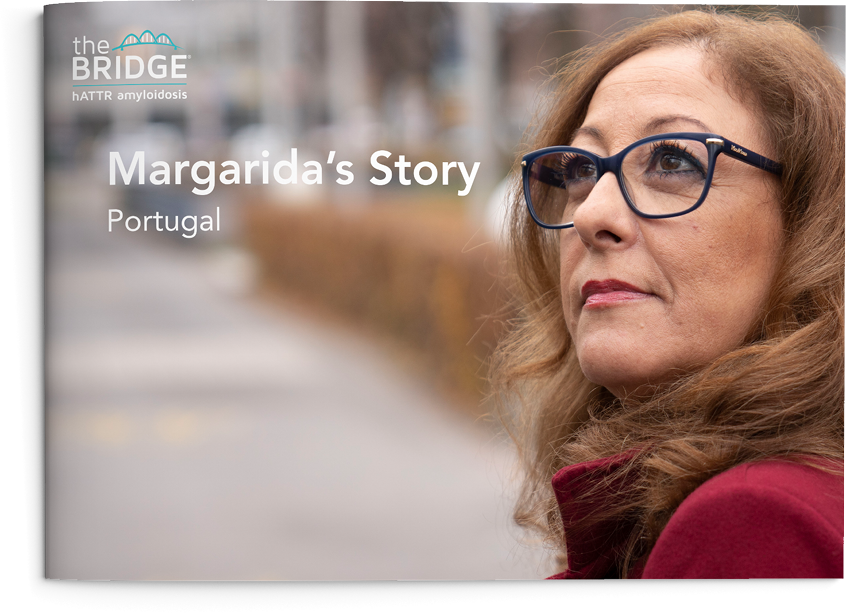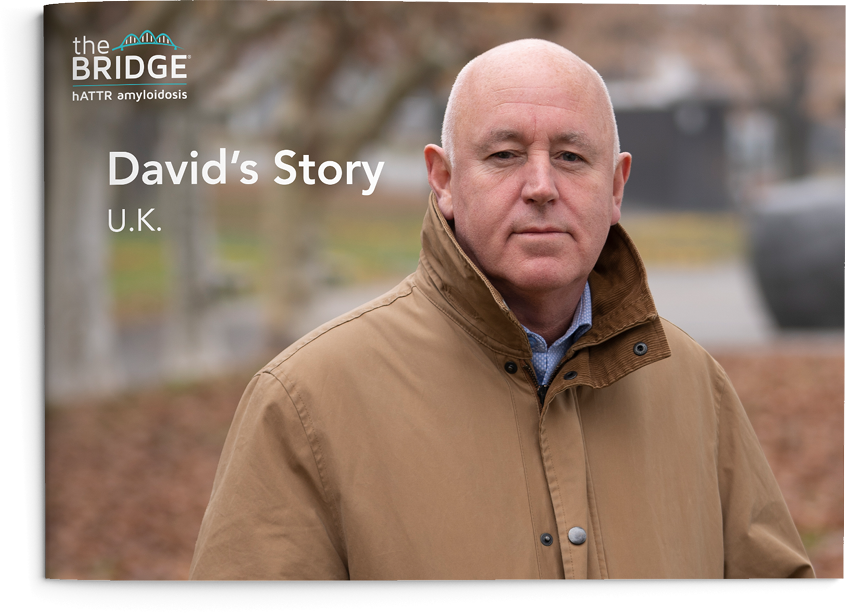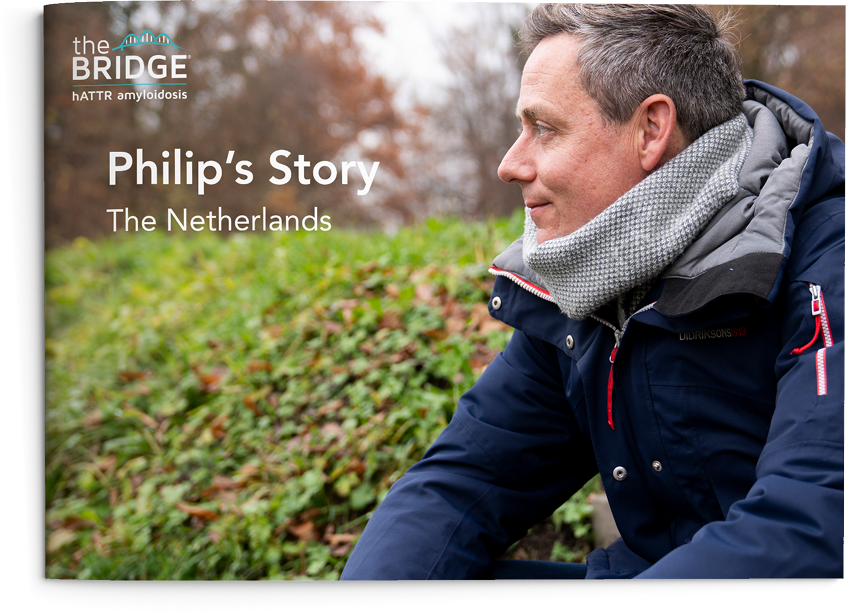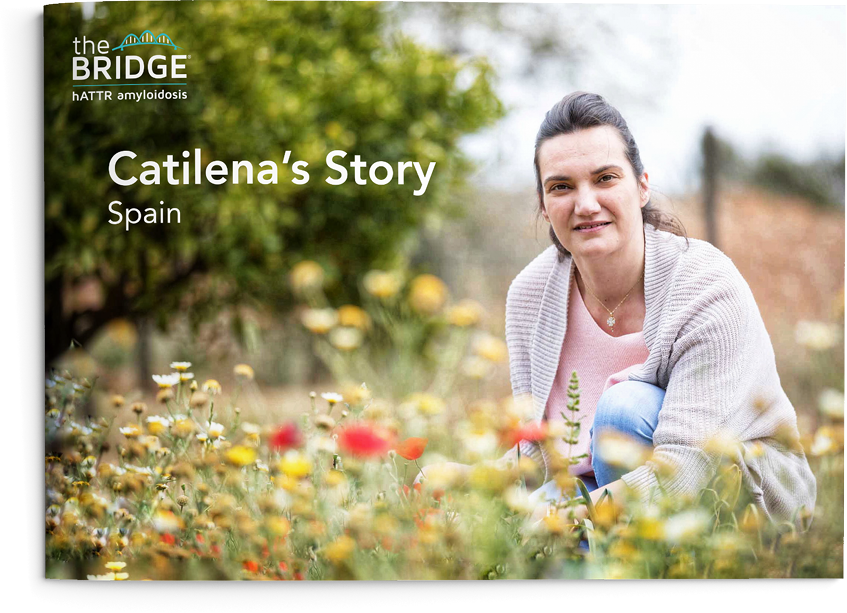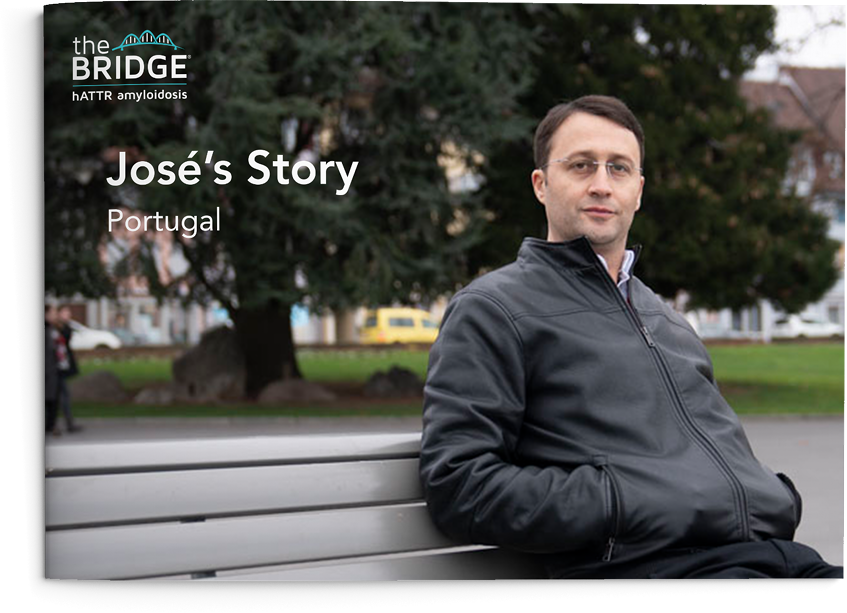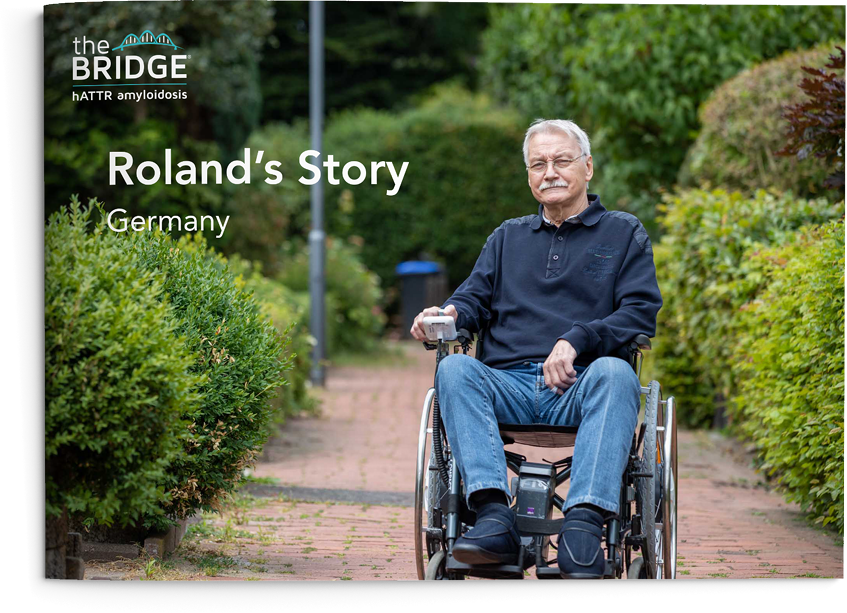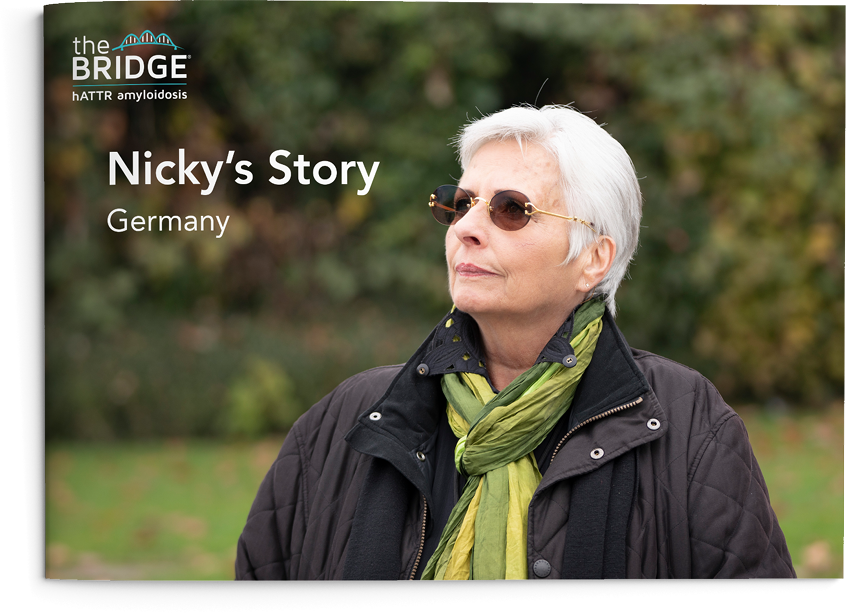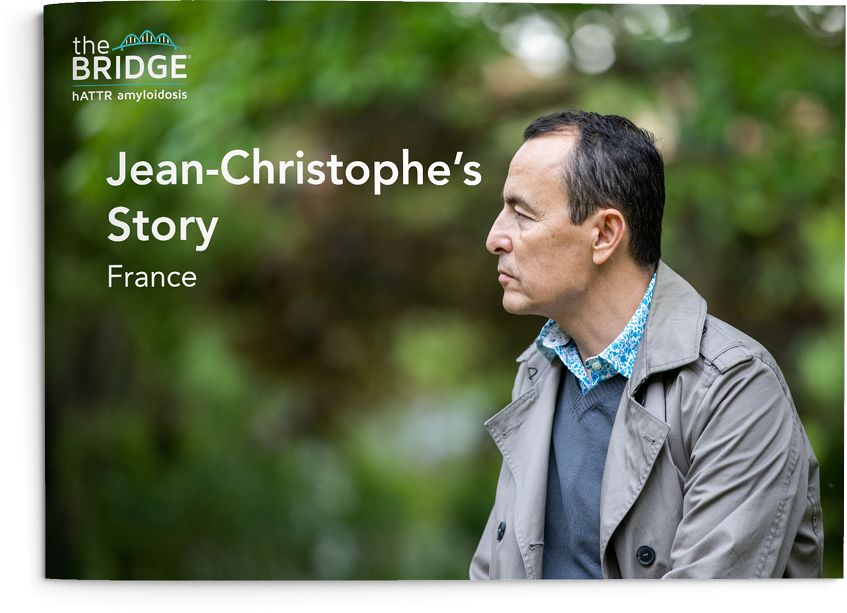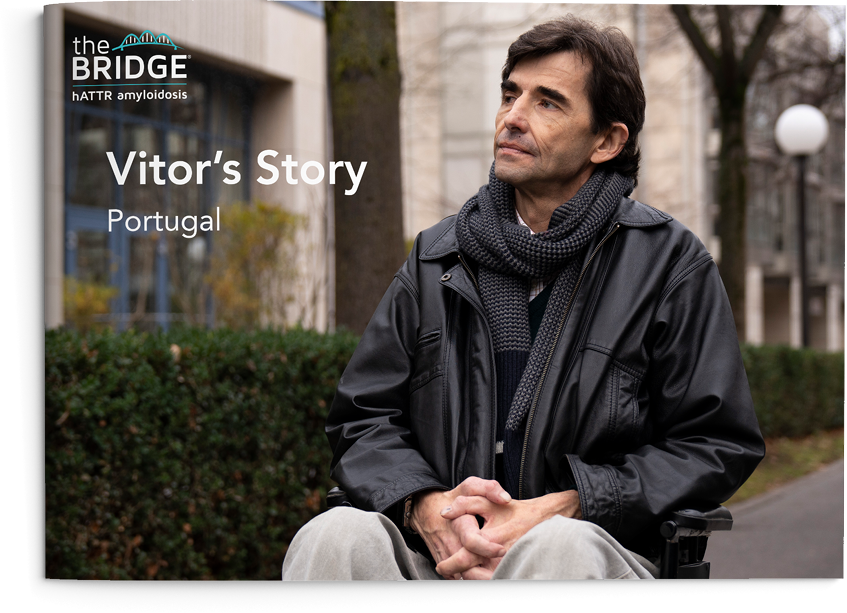Patient Stories
Hello, I am José and I would like to thank Alnylam Pharmaceuticals for sponsoring and supporting me to share my story of living with hereditary ATTR amyloidosis, an inherited gene mutation that accumulates amyloid deposits in the tissues. This disease has been a part of my life for a long time. First, in my mother, and now in me and my brother. Over the course of my life, I have seen how the disease can destroy the body, but I am determined to not let it destroy my mind.
I was born in a small Portuguese village in the north of the country. In my childhood, I lived together with my parents and my brother on a small farm. My mother took care of the household, while my father worked in a factory and dealt with the animals and the fields. I helped my parents out with the animals and domestic work from a very young age. I was also a good student at school and still had a lot of time left to play. Growing up, there was no lack of games, friends, or neighbours. And back then, there were very few cars, so we would play with the other kids on the street until the sun went down. Of course, we were up to no good and the consequence would be a few good slaps, but I deserved them all.
My mother made sure to teach me and my brother how to look after ourselves early on. By the age of 10, we already knew how to cook, do the laundry, and clean the house. She was a super mother. It was as if she knew what would happen in our future.
When my mother was 34, her first symptoms of amyloidosis appeared, which for my brother and me was something we had not quite grasped yet. But everything quickly changed when I was 15 and my mother underwent a liver transplant. It was the only treatment option offered to her, and sadly, due to complications from that surgery, she passed away. However, everything she had taught us up to that point made it possible for us to bear her loss.
In my adolescence, I began to learn more about the disease that took my mother from us, and I knew there was a 50 percent chance for me to have it, too. However, at the time, I was still very young and was more concerned with experiencing my youth and preparing for my future. I did not want to focus on whether or not I was a carrier of the illness. So I put it out of my mind.
Two years later, I finished twelfth grade and got my very first job in a company’s repair centre. Not long after, my father married for the second time and left our home to live with his new family. My brother and I started living alone—I was 18 years old, and my brother 16. At this age, you don’t always care so much about your mother and father, but when you’re without them, you realize how badly you wish they were there. Between finishing school, taking care of a little brother, and dealing with a father who was willing to start over with another family, things were not easy at all. However, we managed to rebuild our lives—I continued to work, and my brother finished his own studies and entered the army.
At the age of 20, I met the love of my life. She was singing in the church choir and after having technical difficulties, the choir called me in to fix it. We were married a couple of years later. From the beginning, I was honest with my wife—she knew about my family history and that there was a possibility I could have the illness, too. Actually, if you have amyloidosis in my village in Portugal, you are automatically “marked”—a person with this disease normally stays close to home and does not have any relations with society. It’s harder to hold a job and have a relationship. So even though my wife’s grandparents have not accepted me, I appreciate how my wife and her mother and father have stood by me and love me just the same.
In the first year of our marriage, we were already thinking about having children and, thus, decided it was time to find out if I was a carrier of the illness. I always held on to some hope that I didn’t have it, but if the contrary were the case, and if we still decided to have children, I wanted to guarantee that somehow our children wouldn’t carry it as well.
My brother decided to get tested at the same time, so both of us went together to get the results. My little brother went in first. Only then did they call me in, and when I entered the doctor’s office, my brother told me my results in the following manner: He said, “You had a test and you must have studied a lot because your result came back positive.” We both were diagnosed at that time. It never crossed my mind that both of us could have the disease. I always thought it might be one of us but never both. The world didn’t end that day, but it felt like it nearly did…
Now that I knew my results, and we were still determined to have children, my wife and I opted for the “pre-natal diagnosis” method to guarantee that our children would be healthy. After three years, our first daughter, Maria, was born. After another two years, our second daughter, Mafalda, was born. Jackpot—two girls! Thanks to my super wife, I am now a “full” man.
My daughters give me purpose, and after they were born, I saw positive changes begin to take shape. I changed jobs, started a professional project all by myself, my wife and I built the house of—nearly—all our dreams, and I kept up with my daughters’ development. Life was wonderful, and I didn’t have time to think about carrying this illness. But, as they say in Portugal, “Good things don’t last for long,” and in 2010, my first symptoms started to appear.
Of course, having this disease wasn’t news to me, but the reality of developing symptoms wasn’t great in any way either. Memories of my mother and how hard it was for her to live with amyloidosis came back to me. But I knew it was necessary to keep my head up and search for a solution. I made an appointment with the same doctor who treated my mother and we scheduled a biopsy of my salivary glands. After 15 days, it was confirmed that I was experiencing the same early symptoms as my mother. In a conversation with the doctor, she told me that there were two options—a liver transplant or waiting for a new treatment.
My mother died during her liver transplant, so I was nervous. But I could not just do nothing, and I believed I must try every option. So I entered the list for the transplant, but because of my blood type, the waiting time was two years. In the meantime, I got to know some other patients in the same situation and became part of the group that petitioned the Portuguese government for treatment options. However, my biggest problem at that time was that my health had begun to deteriorate rapidly. The pain in my feet and legs grew worse, I had morning sickness, I lost 10 kilos, had a lack of physical resistance, intestinal problems, and more.
Since learning I have this disease, my way of seeing the world has changed because I have to think about how much time I have left. I feel like there is a need to live faster, to take advantage of my time, and to stop giving importance to things that don’t matter. I am more focused on what and who I like. Of course, sometimes my way of thinking has a price because not everyone likes this attitude, but it is the way I choose to live my life.
Thankfully, I have finally received treatment, which is some good news. My symptoms are not better, but I do not think they are worse, either. I actually feel like I can finally enjoy some peace, but I do stay busy with work, my family, and school. I like it this way. I am studying computer technologies because in the future, I will need a job that does not require physical labour, pays good money, and allows time to enjoy my family. If I stayed home and didn’t have my job, my mind would start thinking of this disease. I think it’s important to have other things to keep this out of your mind.
Of course, nothing about this is easy. I still have symptoms, and every morning this disease wears on me. As soon as I wake up, I walk out to our garden and vomit so that my family cannot hear me. Minutes later, I’ll walk back into the kitchen with a smile on my face, greet my wife, and say “good morning” to my daughters. It is hard to start every day this way, but I try to forget what happens in the morning and focus on the people I love. Because at the end of the day, I get to come home and sit around the table with my girls—the people I love the most.
I still believe that something in my mother knew she needed to teach us all that she did, so we would know how to live with amyloidosis. Now that I am a father, I can only hope to live up to my own mother and raise my daughters to be as strong and capable as my mother taught me. I know this disease will continue to leave my body weak and tired at times, but I am still sharp, and my mind is still strong.
Thank you.
